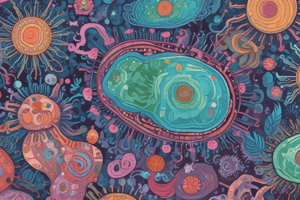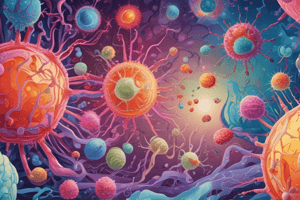Podcast
Questions and Answers
Which of the following can induce loss of self-tolerance?
Which of the following can induce loss of self-tolerance?
- Chemicals or drugs such as quinine or penicillin
- Bacterial infection such as tuberculosis
- Viral infection such as mumps
- Physical agents as x-rays or UV light (correct)
What is the mechanism by which Streptococcus pyogenes can trigger rheumatic fever?
What is the mechanism by which Streptococcus pyogenes can trigger rheumatic fever?
- Complement activation
- Cytotoxic T-cell response
- Humoral immune response
- Molecular mimicry (correct)
What type of immune response is responsible for autoimmune hemolytic anemia?
What type of immune response is responsible for autoimmune hemolytic anemia?
- Type III immune complex-mediated reaction
- Type I hypersensitivity reaction
- Type II or cytolytic reaction (correct)
- Type IV cell-mediated reaction
Which of the following is NOT a mechanism of peripheral regulation?
Which of the following is NOT a mechanism of peripheral regulation?
What is the role of antibiotic therapy in strep throat?
What is the role of antibiotic therapy in strep throat?
Which of the following is an example of autoantibody-mediated autoimmune disease?
Which of the following is an example of autoantibody-mediated autoimmune disease?
What is the primary mechanism of central tolerance mechanisms?
What is the primary mechanism of central tolerance mechanisms?
Which of the following is NOT a cause of tissue damage in autoimmune diseases?
Which of the following is NOT a cause of tissue damage in autoimmune diseases?
What is the consequence of immune complexes of a certain size not being removed by mononuclear phagocytes?
What is the consequence of immune complexes of a certain size not being removed by mononuclear phagocytes?
What is the mechanism by which the immune system normally removes immune complexes?
What is the mechanism by which the immune system normally removes immune complexes?
What is the term for the loss of tolerance to self-antigens, leading to an immune response against the body's own tissues?
What is the term for the loss of tolerance to self-antigens, leading to an immune response against the body's own tissues?
What is the term for the process by which the immune system fails to distinguish between self and non-self, leading to an immune response against the body's own tissues?
What is the term for the process by which the immune system fails to distinguish between self and non-self, leading to an immune response against the body's own tissues?
What is the term for the process by which the immune system recognizes and responds to antigens that are similar in structure to self-antigens?
What is the term for the process by which the immune system recognizes and responds to antigens that are similar in structure to self-antigens?
What is the term for the mechanisms that prevent the activation of autoreactive T cells in the periphery?
What is the term for the mechanisms that prevent the activation of autoreactive T cells in the periphery?
What is the term for the process by which immature T cells that recognize self-antigens are eliminated or inactivated in the thymus?
What is the term for the process by which immature T cells that recognize self-antigens are eliminated or inactivated in the thymus?
What is the term for the antibodies produced against the body's own tissues in autoimmune diseases?
What is the term for the antibodies produced against the body's own tissues in autoimmune diseases?
What is the primary mechanism of central tolerance?
What is the primary mechanism of central tolerance?
Which of the following statements about self-tolerance is false?
Which of the following statements about self-tolerance is false?
What is the consequence of the reappearance of self-reactive clones during adult life?
What is the consequence of the reappearance of self-reactive clones during adult life?
Which of the following organs is responsible for central tolerance in T cells?
Which of the following organs is responsible for central tolerance in T cells?
What is the term for the absence of specific immune response to a particular antigen?
What is the term for the absence of specific immune response to a particular antigen?
Which of the following is an example of specifically induced tolerance?
Which of the following is an example of specifically induced tolerance?
What is the term for the mechanism by which the immune system distinguishes between self and non-self?
What is the term for the mechanism by which the immune system distinguishes between self and non-self?
Which of the following is a consequence of loss of self-tolerance?
Which of the following is a consequence of loss of self-tolerance?
Flashcards are hidden until you start studying
Study Notes
Immunology
- Physical agents like x-rays or UV light, chemicals or drugs, and viral infections can trigger immune responses.
- Exposure to microbial antigens that cross-react with self-antigens can lead to autoimmune diseases, such as rheumatic fever caused by Streptococcus pyogenes.
Rheumatic Fever and Rheumatic Heart Disease
- β-Haemolytic strains of Streptococcus pyogenes can cause strep throat, which requires antibiotic therapy to prevent the development of rheumatic heart disease.
- The M protein on the surface of Streptococcus pyogenes has structural similarity with molecules found in heart valves, joints, and kidneys.
Autoimmune Diseases
- Autoimmune diseases occur due to hypersensitivity reactions, except type I, and can cause tissue damage.
- Humoral hypersensitivity immune responses, such as type II or cytolytic reactions, can lead to autoimmune hemolytic anemia.
Hypersensitivity Reactions
- Type III hypersensitivity reactions involve the formation of immune complexes (Ag-Ab) that can deposit in small blood vessels, leading to inflammation (vasculitis).
- Immune complexes can cause harm, particularly in persistent infections, inhalation of antigenic material, or autoimmune diseases.
Immunological Tolerance or Self-Tolerance
- Immunological tolerance refers to controlled specific immunologic unresponsiveness to an antigen, which can be naturally acquired or specifically induced.
- Naturally acquired tolerance occurs during fetal development and involves unresponsiveness to one's own antigens, while specifically induced tolerance is used in therapy for allergic conditions and allograft rejections.
Self-Tolerance Mechanisms
- Central tolerance occurs in central lymphoid organs, such as the bone marrow and thymus, where self-reactive lymphocytes are eliminated or inhibited.
- The elimination of self-reactive clones during fetal development prevents autoimmune diseases, and their reappearance in adulthood can lead to autoimmune diseases.
Studying That Suits You
Use AI to generate personalized quizzes and flashcards to suit your learning preferences.




